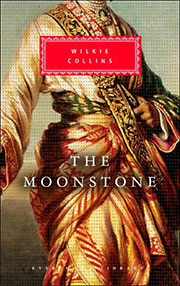 In Willkie Collins’ quite wonderful Victorian novel, The Moonstone, (T. S. Eliot said it was the first and best detective novel) there is a character—the head servant—Gabriel Betteredge, who, when perplexed by a problem, opens up his ragged copy of Robinson Crusoe and arbitrarily selects a passage which tells him what to do. This is a variant of those who use the Bible in just the same fashion. I suppose one might do so for any great work of literature, Hamlet, Don Quixote, or War and Peace.
In Willkie Collins’ quite wonderful Victorian novel, The Moonstone, (T. S. Eliot said it was the first and best detective novel) there is a character—the head servant—Gabriel Betteredge, who, when perplexed by a problem, opens up his ragged copy of Robinson Crusoe and arbitrarily selects a passage which tells him what to do. This is a variant of those who use the Bible in just the same fashion. I suppose one might do so for any great work of literature, Hamlet, Don Quixote, or War and Peace.
It’s also a good way to revise your own work.
Say you’ve written a novel, and you are still in the process of revising it. Having read your own work hundreds of time, it’s sometimes hard to focus on the particular. Your eyes just gallop over the text. You know it so well you are not really reading it.
Try doing what Gabriel Betteredge did: Open your work at random, and read your work arbitrarily, a paragraph, here, a paragraph there. You will be sharply focused, and you will see your writing out of context, which can actually be quite helpful.
It’s a classic case of less being more: The less you read, the more sharply you will see what you have written.
2 thoughts on “A classic case of less being more”
I think that practice is called “Bible Dipping” and I did it for the first time in 15 years the other day. Didn’t work out as well. I’m gonna try your suggestion. 🙂
You’ve described the working on the manuscript (too long today) blues. Perfect suggestion. 🙂